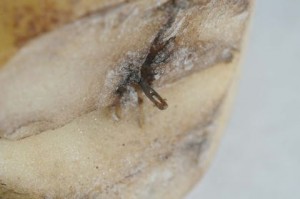Eastern Canada —Earlier this year in May, an employee of a grocery store found something suspicious as he was stocking bags of potatoes. To his horror, he discovered metal sewing needles and metal nails had been deliberately inserted into the potatoes. Unfortunately, the residents of Eastern Canada were no strangers to such observations. In October of the previous year, there were several reported cases of sewing needles found in potatoes as well. This incident prompted relevant farms and the federal government to reevaluate their current food safety protocols and to determine if the existing equipment used for detection are adequate to uphold the standards for consumers’ safety.
October 2014 —Metal needles were found in potatoes by customers, which were traced back to farms on Prince Edward Island. After a period of investigation, it was found that these potatoes had most likely originated from Linkletter Farms in Summerside, PEI. The CFIA has been working with the RCMP to find the culprit responsible for this horrible crime, but so far there have been no promising leads. Luckily, there were no reports of illness or injury.
After the first incident in the fall, Prince Edward Island had already increased the sensitivity of its food safety measures to detect metal pieces. However, shortly after they implemented these procedures, they found more sewing needles in their facility in December of 2014. Fortunately, the tampered foods were discovered prior to distribution, so no recall was required for this time.
May 2015 — Loblaws voluntarily recalled Russet potatoes belonging to Famer’s Market Brand and Strang’s Produce after an employee noticed needles in the tampered products. These products have been distributed to several stores within the company and they have since then recalled the potatoes from their shelves. However, this problem which was thought to be halted and contained in Prince Edward Island earlier this year, has now dispersed to Newfoundland and Labrador, New Brunswick, and Nova Scotia. The similarities of this food safety incident and the ones from late last year has brought more concerns to the involved parties. Fortunately, the metal materials were found before anyone got seriously sick or injured.
Determined to find the culprit, Prince Edward Island’s potato industry has increased the reward for any information leading to the arrest of the person responsible for this heinous crime. From the previous $100,000, the reward increased to $500,000. Furthermore, the RCMP has released information stating that the tampered potatoes did not originate from the farm involved in the October incident.
The repercussions of this incident has shown in the decrease of the public’s confidence in potatoes. The Canadian government realized that this is a disaster to the agricultural businesses in Atlantic Canada. They helped by providing $2 million in an effort to aid those farmers who have been devastated during this food terrorism act. The government also thought it was worthwhile to allocate funds to install new metal detection equipment to prevent such threats from occurring in the future.
At this point, these cases still have not been solved.
Personally, after following this story, I too have lost a bit of confidence in the safety of Canada’s food supply.
Even though these tampered potatoes have not reached Western Canada, knowing that these dangerous metal pieces made it into stores intact, how do you feel about the safety of the foods we eat?
http:////www.ctvnews.ca/video?clipId=521970
October 2014
http://www.theguardian.com/world/2015/jun/30/canada-potatoes-food-terrorism-prince-edward-island
http://www.ctvnews.ca/canada/sewing-needles-found-in-10-p-e-i-potatoes-1.2100463
http://www.ctvnews.ca/canada/more-needles-found-in-p-e-i-potatoes-1.2166223
May 2015
http://www.torontosun.com/2015/05/23/loblaws-recalling-russett-potatoes-from-atlantic-canada-stores
http://www.torontosun.com/2015/05/25/ns-grocery-store-employee-finds-another-nail-in-recalled-potato
http://www.torontosun.com/2015/06/29/reward-increased-to-500000-in-potato-tampering-investigation-in-pei
http://www.cbc.ca/news/canada/prince-edward-island/potato-tampering-tips-award-raised-to-500k-1.3131546
http://www.theguardian.com/world/2015/jun/30/canada-potatoes-food-terrorism-prince-edward-island
http://www.cbc.ca/news/canada/prince-edward-island/potato-tampering-prevention-gets-2m-investment-1.3122541
http://www.cbc.ca/news/canada/prince-edward-island/pei-potato-metal-detectors-tampering-1.3293375


9 responses to “Case of Food Terrorism? Metal Needles and Nails Found in Potatoes in Atlantic Canada”